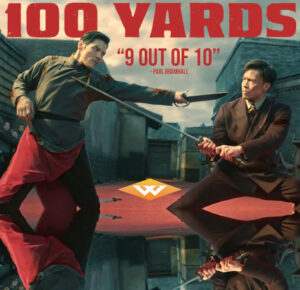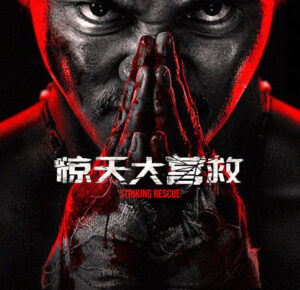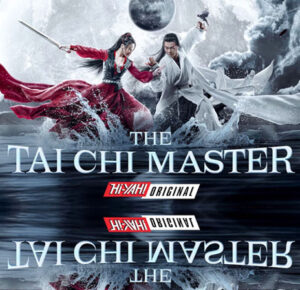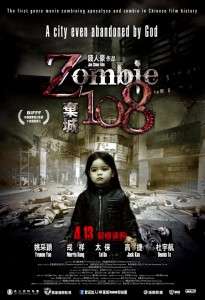 Four decades ago, Hwang Jang Lee burst onto kung fu movie screens with his thunderous kicks, and for the next 20 years he didn’t stop kicking. There’s not too many Hong Kong legends that haven’t been on the receiving end of his boot at one point or another, and he himself is rightly considered a legend in the world of kung fu cinema, dubbed the King of Leg Fighters.
Four decades ago, Hwang Jang Lee burst onto kung fu movie screens with his thunderous kicks, and for the next 20 years he didn’t stop kicking. There’s not too many Hong Kong legends that haven’t been on the receiving end of his boot at one point or another, and he himself is rightly considered a legend in the world of kung fu cinema, dubbed the King of Leg Fighters.

“Snake in The Eagle’s Shadow” Chinese Theatrical Poster
In September 2014, thanks to the efforts of Ricky Baker and Toby Russell, Hwang headed to the UK for the first time to attend the SENI Strength & Combat Event in London. During his brief visit, I was able to land a private one-on-one interview with the master himself.
Dressed in a sharp black suite, at the age of 70, Hwang exuded an effortless cool, and looks at least 20 years younger. The interview was a very enjoyable and relaxed affair, and hopefully I’m correct when I sensed he was enjoying it as much as I was. Armed with a gravely voice and an ability to switch between both Korean and English, which he regularly did, Hwang in real life is the opposite of his villainous onscreen persona. That being said, he has an undeniable presence of authority about him, no doubt ingrained into his character through years of Taekwondo training, and the time I spent with him was an unforgettable experience.
Note: Unless it states otherwise, the interview was conducted with myself speaking English and Hwang speaking Korean. If at any point Hwang started talking in English and finished in Korean, I’ve entered a space to indicate this.

Preparing Hwang Jang Lee for the media.
PAUL BRAMHALL: (speaking in Korean) Hi Master Hwang, nice to meet you, and welcome to the UK. You’ve been here since Thursday, what’s your impression of the country so far?
HWANG JANG LEE: *laughter* I like the UK, but since I arrived my schedule has been full of interviews with journalists every day!
PB: I see, too many interviews, and now you have another one!
(HJL laughs)
So I wanted to start by asking you, 30 years ago it was always Hong Kong and Japanese movies which were very popular. However since the late 90’s, the Korean movie scene has really broken out into the mainstream. Do you have any particular favorite Korean movie?
HJL: I like Korean movies a lot, however these days many of the movies coming out of Korea are period pieces, or dramas, so I’m not so interested in these types of genre. If it was a movie that featured martial arts, I’d watch it, but there are not so many of those these days.

Hwang Jang Lee getting the best of Jackie Chan in “Drunken Master.”
PB: How about City of Violence or The Man from Nowhere?
HJL: I’ve heard of these movies, and especially Won Bin is a very popular actor, but I haven’t seen them yet.
PB: Do you have any particular Korean actor you’d like to work with if you were to make another movie?
HJL: *laughter* The movie stars these days are so young, they’re like children! I think I’m too old to work with them, we’re not compatible anymore!
PB: How about Ahn Seong-gi!?
HJL: Sure! But he’s still so young as well!

“The Secret Rivals” Chinese Theatrical Poster
PB: *laughter* Going back just 20 years, nobody really knew about Korea, let alone its movie scene. However these days with the Hallyu Wave we have things like K-pop, Korean food, and of course Korean movies, which have given Korea an international exposure which it’s never experienced before. How do you feel now that Korean culture has become so popular on a global scale?
HJL: I’m really thankful that my country has now become so popular throughout the world. Now Korea and Korean brands are advertised and popular in many countries, so it’s a good thing that so many people now know about Korea.
PB: I agree! Now, I read that you used to be a trainer in the Korean army. Of course even today it’s still mandatory that every Korean male has to complete a minimum of 2 years service in the army. Do you agree with this policy, or do you think it’s no longer needed in these times?
HJL: Absolutely, I think it’s essential that every Korean guy goes to the army for that time. It’s very important for our country.
PB: And what do you think of the Korean army training now? Do you think it’s very different from when you were there, or is it still similar?
HJL: Hmmm, basically it’s the same, however when I was there the training regimes were much more strict and tough. Back then they would be really tough on every individual, however now there is more of a group focus.

Hwang Jang Lee, Jiyeon Kim (translator) and Paul Bramhall.
PB: I see. Obviously you’re very passionate about Korea, so I wanted to ask about your acting days in Hong Kong. You predominantly worked in Hong Kong all the way up to the late 1980’s, before I read that you moved back to Korea. Was there any particular reason which made you decide to move back there?
HJL: One time when I was visiting Seoul, my wife, who was living in Hong Kong at the time, called me and said “Husband, I’ve decided, I want to live in Korea from now on!” So I said, “OK!” *laughter* So we lived in Korea for a while, and then after a few years we planned to move back to Hong Kong. However when I moved back, there was nothing! The martial arts film had finished. So then, we moved back to Korea again *laughter*.
Speaking in English: I thought it was a joke, you know!? I thought this is so easy, just say “OK!”
PB: *laughter* So you’re not the big boss, your wife is the big boss!
HJL: Speaking in English: That’s right!

“Tower of Death” Japanese Theatrical Poster
PB: So when you decided to return to Korea to settle down, did you still want to carry on making movies there, or what did you find yourself doing?
HJL: When I first moved back to Korea, there were a lot of people who were asking me to be involved in their movie, so for the first few years I made a couple of movies. After that, I owned a hotel and decided to give up acting for the time being.
PB: Actually I remember reading on the internet maybe 10 years ago now, that you were the owner of a golf factory. Was there any truth to this?
HJL: (Speaking in English) Ahhh, yeah, I did, but this wasn’t in Korea, it was while I was living in Hong Kong. It was a golf-tee factory that I was the owner of, and the factory was in the Philippines. A golf company based in the USA asked me to make golf-tee’s for them, so I made it for them.
PB: So you can say you’ve been a Taekwondo master, an actor, a hotel manager, and a golf-tee factory owner!
HJL: (Speaking in English) *laughter* Yes, so many!

Paul Bramhall and Hwang Jang Lee emulating a trademark style.
PB: Now in 2009 you returned to Korean TV screens playing Miyamato Musashi in the drama The Return of Iljimae, what made you decide to briefly return to acting?
HJL: Ah, yes, the broadcaster asked me if I’d like to be in the series. So I spoke with the director and the crew of the series, and the situation seemed good, so I agreed to play the part.
PB: Now, we may have touched on this earlier – back in Hong Kong you made so many kung fu movies that everyone knows and loves, but I wanted to ask, are you yourself a fan of kung fu movies, or you just liked to act in them?
HJL: (Speaking in English) *laughter* Oh yeah, I like them! Of course!
PB: Great! Which ones do you like the best, the old-school movies or the newer ones?
HJL: (Speaking in English) I like all of them!
PB: I saw that you recently met with another famous Korean kung fu movie star, Casanova Wong. If you guys had a chance to make a reunion movie together, would you be happy to make it?
HJL: Yeah, I want to! But now so many Korean movies are historical battle movies or dramas, it’s difficult to make an original martial arts movie.

Yasuaki Kurata, Hwang Jang Lee and Yukari Oshima in “Shanghai Express.”
PB: Right, that’s true for everywhere at the moment. Speaking of Casanova Wong, I always wondered when you were living in Hong Kong, there were many Koreans working there at the same time – aside from you and Casanova there was Kwan Young-moon, Kim Tai-jung, and a few others – was there like a Korean community of martial arts actors in Hong Kong and you all used to hang out together?
HJL: Around the period that I was living in Hong Kong and there were other Korean actors working there, I’d already been acting for quite a long time, and many of the others were just starting out. I assumed that maybe they were experiencing some problems settling in or they were bored, so I wanted to help them. But we were all always so busy, so a Korean community never really formed.
PB: I see, and what would you say is your favorite memory of living in Hong Kong?
HJL: You know when I was living in Hong Kong, I couldn’t really enjoy it, because I was working on some movie every single day. So when I would finish my work for the day, I would just go home and take a rest.

“Hitman in the Hand of Buddha” Korean Theatrical Poster
PB: On the internet you’ll often see polls on kung fu movie sites which debate about who is the best kicker of all time. Of course in these polls, you are always number 1! So I wanted to ask, if Hwang Jang-lee was to make his poll of top kung-fu fighters, who would be your top 5?
HJL: (Speaking in English) Ok! 1. Jackie Chan; 2. Yuen Biao, and then, ummm,; 3. Lo Lieh,; 4. Ti Lung, and, ummmm; 5. Sammo Hung
PB: *laughter* No John Liu? He’s Number 6?
HJL: *laughter* I would rank John Liu much lower.
* This comment was made due to the previous interview conducted by a Spanish couple, who were making a documentary on John Liu. When asked about Liu’s onscreen fighting technique, HJL responded that Liu’s timing was not good, and often he would move in too close when they were filming a fight scene, which resulted in HJL frequently kicking or punching Liu full force by accident. He went on to explain that at the end of filming, Liu would often be covered in bruises!
PB: I saw an interview with Casanova Wong in which he explained how grateful he was to Sammo Hung, as when he first came to Hong Kong, Sammo acted as a kind of mentor as to how the Hong Kong movie industry works and how to perform onscreen fighting. I wanted to ask if you had any similar relationship like Casanova had with Sammo when you first came to Hong Kong?

Hwang Jang Lee still has it.
HJL: When I first came to Hong Kong I was already set up to start working on movies straight away, so I was always so busy even from the very first day. In that way I was different from Casanova, as I never had the time to take a break and have that relationship. In that way you could say that I taught myself.
PB: Ok, so I have to ask, out of all of the movies you’ve made both in Hong Kong and Korea, or anywhere else, which one would you say is your number 1 personal favorite?
HJL: Hmmm, it’s a tough question, at the time that I was working in Hong Kong, the quality of the martial arts movie was so high, and we were making so many compared to present day. But if I have to choose one, I think I would have to say Drunken Master is the favorite of my movies. For me, even now it is one of the best martial arts movies in the world.
PB: I agree! While we’re on Drunken Master, it seemed that you’d almost always play the bad guy in the movies that you were in. Was that a conscious decision by you, or just the types of roles that you were offered?
HJL: *laughter* You know I was always too powerful, so every time I made a movie, I had to be the bad guy. I wanted to be the good guy, but the audience couldn’t accept it, because of my power, nobody wanted a good guy who was too powerful. So I would always be asked to play the bad guy.

“The Invincible Armour” Chinese Theatrical Poster
PB: Now, both in Hong Kong and Korea there were a few movies in which you tried your hand at directing – Hitman in the Hand of Buddha, Canton Viper, Emperor of the Underworld. Did you enjoy directing, or did you prefer just to stick to acting?
HJL: (Speaking in English) I like acting, but as an actor, any actor, can be dreaming that they want to be a director. At the time I had some power and money, so I used my money to control my directing, so for example I went back to Korea and made Canton Viper.
PB: Right, I see. In 1981 as well as directing Hitman in the Hand of Buddha, you also made the Taekwondo instructional film The Art of High Impact Kicking. What made you decide to make this?
HJL: (Speaking in English) Ah, you know Roy Horan?
PB: Yes, I do.
HJL: (Speaking in English) I talked to Roy Horan, so we were discussing it together. But Roy Horan, he is thinking too much! He said “Yeah, yeah, yeah, it’s a good idea!” So we asked Ng See Yuen….do you know Ng See Yuen?
PB: Sure, the producer?
HJL: (Speaking in English) Yes, so Ng See Yuen, he came to see me and said “Ok, make it!” *laughter* And you know this one, it did good business across the whole world!

A few tips from the master.
PB: Right right, even now it’s still popular.
HJL: (Speaking in English) Yeah yeah. When you watch it very closely and concentrate, I show you everything in detail. So you can learn from me very easily, you can do everything I do by yourself. *laughter* Just with this documentary, it’s easy to be like me.
PB: *laughter* I don’t think it’s so easy, but I’m pretty sure it would be so painful! And was it true that you also taught your style to Roy Horan?
HJL: (Speaking in English) Yes that’s true. He was very good, that guy was very smart.
PB: One thing I love about kung fu movies are the stories that you hear about making them. Often you’ll hear that this person was very powerful, this person was the real deal, Hwang Jang-lee’s kicks are so powerful!
(HJL laughs)
Was there anyone that stood out for you that you worked with, who when you were filming a fight scene you thought, yeah, this guy is the real deal and knows how to fight?

“Lackey and the Lady Tiger” Chinese Theatrical Poster
HJL: Sammo, I believed that Sammo was very powerful. Even though he was really big, he was still really fast. During the filming of the finale in ‘Where’s Officer Tuba’, we were pretending to fight, like sparring, off camera, and we were both so fast that all of the crew was very surprised. Then, I accidentally hit Sammo in the nose and knocked him down, he waved his arms and said “Wait!” *laughter*. I asked him “Are you ok?”
PB: *laughter* So when you were working in Hong Kong, did you ever have any difficulties due to the language differences?
HJL: (Speaking in English) No, I learned Mandarin, and then I realized that I liked it there, so I learnt Cantonese.
PB: Ok, so out of the new martial arts movies that are being released these days, is there anyone who you feel is an exceptionally good martial artist?
HJL: I haven’t really watched any of the newer movies. I feel like these days, compared to the past, the movies aren’t really very good, so I haven’t seen them.
(Speaking in English) Maybe now if you’re a good martial artist and you can make a martial arts movie, it would do very good business.

Hwang Jang Lee signing memorabilia for fans.
PB: Ok. You’ve had such an interesting life, have you ever considered writing an autobiography?
HJL: Ahhh, many people have also asked me this question before, and also I’m thinking to make a movie about my life could be good as well. But at the moment, I haven’t given it too much thought. I have many many ideas though.
PB: You should, it would be a bestseller! & if there was to be a movie made about your life, which actor would you want to play you?
HJL: (Speaking in English) *laughter* I don’t know who, I have to try and looking for someone, or maybe if I shoot my story, I can play me, I’m not acting! Then I can control my picture, you know?
PB: Count me in, I’ll watch it! Well you’ve been living back in Korea a long time now, what would you say is your favorite place in Korea?
HJL: Anywhere I can play golf!
PB: *laughter* I know now you’re living in Seoul, but was it true that you used to live on Jeju Island?
HJL: (Speaking in English) Yes, that’s true, but now I don’t live there anymore. When I mentioned earlier that I owned a hotel, this was on Jeju Island, but since then I’ve sold it and now I don’t go there anymore.

Young and dangerous.
PB: So now you would say that you’re mainly a Taekwondo teacher?
HJL: (Speaking in English) I wouldn’t say it’s like my main job, just you know, someone like me, I don’t teach groups, not just anybody, but I’ll teach one by one. Are you good, or not? & a really good teacher, they’ll be very hard, very strict. I have one story – there was a woman, she was 44 years old, and she liked me very much. She asked me, “Can you teach me?” So I said, “Yeah.” So the next day, she came again, and she asked me, “When will you start teaching me?” So I said to her, “Any time, any time you want.” “Ok.” She said, “So let’s start tomorrow.” Oh, tomorrow! *laughter* She had a job working for the government, but she was already retired, so I was so surprised, tomorrow start ok! So then I talked to her and told her if she wants to learn, it’s every day 4 hours, can you do that? “Yes, of course.” Ok, let’s try, and every day I taught her for 4 hours. After 6 months, she was a 5th degree black belt, she passed already. I taught her everything, and she got the qualification to open a Taekwondo school. Now she’s living in Germany, and right now she’s preparing to open a Taekwondo school there.
PB: Wow, and she was 44?
HJL: (Speaking in English) Yeah.
PB: So do you think it’s possible for someone of any age to learn martial arts?
HJL: (Speaking in English) Yeah, no problem, I have many experiences, so even if you’re 4, no problem, even if you’re 80, no problem. It’s all in the mind, will you do it, or not? You do it, ok, let’s do it. Maybe you’ll stop, maybe you’ll carry on. But if you have a strong mind, it’s ok.
PB: A strong mind, and after that, a strong body!

“Canton Viper” Korean Theatrical Poster
HJL: (Speaking in English) It’s all easy you know, all the movement, it’s all easy. It’s all in your mind.
PB: Wow, it’s very easy!?
HJL: When I started to learn martial arts, nobody taught me, but now I can teach other people, so it’s easy to learn.
PB: Ok, I’m going to have to start learning. *laughter* That wraps up all of my questions.
(Speaking in Korean): Thank you so much!
HJL: (Speaking in English) You’re welcome, good job!
With that, the interview came to a close. While the questions might have been over, seemingly invigorated by all the kung-fu movie talk, Hwang took the time to bust out a few classic kung fu stances, and for a moment we were transported into a real life old-school kung fu movie, as he preceded each pose by announcing “Tiger!”, “Snake!”, “Crane!”. Of course in the movies, Hwang was almost always defeated in some unlikely manner by the underdog hero, but today, he got to stand his ground, and I left the room with nothing but respect for someone who is undoubtedly one of the most recognizable faces in the world of kung fu cinema.
Bonus: Best of the Rest!
The best questions from an audience Q&A on 14th September
* HJL answered all of the questions in English
Audience member: How do you condition your legs?
HJL: You know my legs are just normal, there’s nothing special about them. When I train I always use my hips, use the circular motion (HJL starts to sway his hips not entirely unlike a hula dancer!), the hips is where the power comes from. Then I kick like this (busts out a side kick), and like this (busts out a front kick – audience goes crazy), it’s all coming from the hips.

Hwang Jang Lee gives it to Cynthia Rothrock in “No Retreat, No Surrender II: Raging Thunder”
Audience member: You’re a master of Taekwondo, but how did you learn all of the other kung-fu styles that you use in the movies?
HJL: You know they’d just show me on the set, so this is how you do Eagle Claw (breaks out an Eagle Claw pose, audience goes crazy), this is how you do Snake Fist (breaks out a Snake Fist pose, audience goes crazy), so yeah, this is how I learnt, just make them up.
Audience member: You were in quite a few of the Bruceploitation movies, are you still in contact with any of the people you worked with on these movies?
HJL: Yeah, you know Bruce Le? We made a few movies together in Europe. Actually he called me just last month, he asked if I want to be in a new movie with him. I said, sure, let’s see.
Audience member: Obviously you learnt a very real form of Taekwondo, but what’s your opinion of Olympic Taekwondo?

Paul Bramhall and Hwang Jang Lee.
HJL: You know this is very different, Taekwondo, you know, it’s for killing people. (Audience laughs, before quickly realizing he’s being deadly serious) Taekwondo in the Olympics, it’s a sport, you know, it’s not a martial arts, so I don’t really like this style. For me Taekwondo is a martial art.
Special thanks to Jiyeon Kim who was on translation duties, and went the extra mile by taking the time to acquire Hwang’s business card for me! Next time I’m in Korea, I know who I’ll be texting!



















 Four decades ago, Hwang Jang Lee burst onto kung fu movie screens with his thunderous kicks, and for the next 20 years he didn’t stop kicking. There’s not too many Hong Kong legends that haven’t been on the receiving end of his boot at one point or another, and he himself is rightly considered a legend in the world of kung fu cinema, dubbed the King of Leg Fighters.
Four decades ago, Hwang Jang Lee burst onto kung fu movie screens with his thunderous kicks, and for the next 20 years he didn’t stop kicking. There’s not too many Hong Kong legends that haven’t been on the receiving end of his boot at one point or another, and he himself is rightly considered a legend in the world of kung fu cinema, dubbed the King of Leg Fighters.





















14 Comments